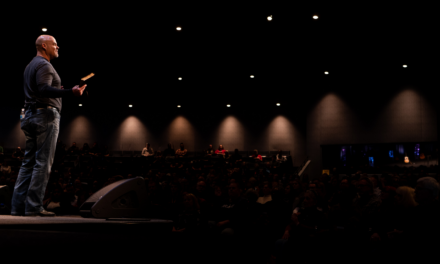Grow your church by teaching your congregation the scriptural basis for carrying the load
When pastors are too busy to pastor, a church can’t grow and the congregation’s needs mount… but that doesn’t have to be your story. | by Alton Garrison
In my first year at a new church, I preached on a paradigm-shifting topic—the priesthood of all believers. This was a point of disagreement between the vice chairman of the church board and me. He believed they had hired me to do the preaching and ministry while the board ran the church. Most of the rest of the people in the congregation had a role, too: to attend and give generously. I was the hired gun, and they were there to watch.
During my first year at the church, I preached fifteen weeks on a counter-cultural concept for our church: Ministry doesn’t just happen from the pulpit but from the pews as well. Our board members, leaders, and attendees needed to progress beyond their current realities in Christ to become integral partners in ministry.
In Ephesians, Paul wrote that a pastor’s responsibility is “the equipping of the saints for the work of ministry, for the edifying of the body of Christ” (Eph. 4:12). Though most leaders and churchgoers have never thought of it in these terms, they often expect that the pastor is the one doing the work of ministry. This assumption promotes the concept that everyone else in the church is just a “helper” who has no ownership or buy-in.
Many smaller churches experience this because the burden falls on the pastor and his wife to do everything. These “mom and pop” style churches put tremendous pressure on the pastor to do the work of ministry. Too many pastors think that church growth is the solution for this problem.
To grow our churches, we need to change this paradigm—in ourselves and in our churches, no matter how large or small they are. A bigger church may have a larger staff who feel they must do all the work of ministry by themselves. In point of fact, the staff should be equipping God’s people to do the work, not doing the work by themselves.
The Bible teaches that we are a kingdom of priests. Peter wrote, “You are a chosen people. You are royal priests, a holy nation, God’s very own possession. As a result, you can show others the goodness of God, for he called you out of the darkness into his wonderful light” (1 Peter 2:9 NLT). Preachers aren’t modern priests. Each believer has the indwelling presence of the Holy Spirit, and the entire congregation shares the mission of showing God’s goodness to others.
The plumber in your church is a priest. Plumbing is what he does to support his priesthood. The accountant is a priest. Accounting is what she does to support her priesthood. Each believer is part of a royal nation and is called to “full-time ministry,” even if they aren’t paid full-time ministers. All of us should be living out our ministries on a daily basis.
When ordinary churchgoers catch the revelation that they don’t come to church to receive ministry but to minister, this incredible paradigm shift causes churches to explode with life and health. We are all priests, and priests don’t come to the temple to be blessed—they come to minister. Because of God’s goodness, we get blessed as an ancillary benefit of coming to church, but the primary purpose of every priest in your congregation is to minister to those who are far from God.
We are all priests, and priests don’t come to the temple to be blessed—they come to minister.
Jewish priests had to pack up and move the Tabernacle, slay and butcher the sacrifices, and clean up the blood afterward. It was dirty, gruesome, difficult work. Modern priests have responsibilities as well—inviting friends and co-workers to church, greeting visitors warmly, serving the next generation in children’s programs, and doing whatever else it takes to do the Lord’s work.
Believers come to church to be blessed and ministered to, but that isn’t the end of the story. Like Abraham, they are “blessed to be a blessing” in the lives of everyone they meet. Jesus explained the principle of overflow at a feast in Jerusalem. Each day of the weeklong event was a rising crescendo of sacrifices and washings. John explains this:
On the last day, that great day of the feast, Jesus stood and cried out, saying, “If anyone thirsts, let him come to Me and drink. He who believes in Me, as the Scripture has said, out of his heart will flow rivers of living water.” But this He spoke concerning the Spirit, whom those believing in Him would receive; for the Holy Spirit was not yet given, because Jesus was not yet glorified. (John 7:37–39)
When you and the people in your church catch this principle, it’s an incredible ray of hope and a source of strength because you’ll no longer feel alone as a minister. As you teach this and the people grasp it, you won’t be surrounded by “helpers.” You’ll be surrounded by an increasing number of “priests” who are overflowing with the love, forgiveness, and power of the Spirit. People who buy into this will feel a greater sense of ownership than ever before, and it will transform the way you do ministry.
The people don’t exist to help the pastor. The pastor exists to help the people fulfill their callings. That calling for each and every Christian includes the Great Commission, which is the mission and purpose of the church and every part of the body of Christ: “Go and make disciples of all nations, baptizing them in the name of the Father and of the Son and of the Holy Spirit, and teaching them to obey everything I have commanded you” (Matt. 28:19–20 NIV). This mandate isn’t just for pastors. It’s for every believer.
This concept of the priesthood of all believers is the catalyst for every other component of the Acts 2 model that we teach. None of it will work without this shift of perspective. Otherwise, the pastor will have helpers instead of co-owners of the church’s mission and vision. What Acts 2 asks, you can’t do by yourself as a church leader—you must have the people with you. It’s absolutely essential to grasp this concept yourself and to teach it as long as it takes for the people to get it.
Something amazing will happen when the people really buy in. If you catch nothing else that I’ve learned, hold on to this and watch it transform your church and your ministry.
MANY HANDS
When I began pastoring in North Little Rock, it was a church of about 500 people, and a few of them did all the work. Beneath the surface of my travel and ministry resources, the confrontation with the board was precipitated by my fifteen weeks of preaching that the people in the pews were a kingdom of priests and needed to be ministering.
By the time I left, the church had tripled and perhaps a thousand of them were involved in service of some sort. I would never have gotten so many people to buy in and get involved if the concept had persisted that I was hired to preach and do all the ministering, letting the board run the church.
This foundational biblical principle has changed more churches than just the one I served. It’s a central component in setting up the Acts 2 process. You won’t get a sense of ownership from co-laborers who share your vision unless people understand that it’s more than simply volunteering: It’s a biblical mandate.
When you make the leap and people understand they’re supposed to be contributors and not consumers, everything changes.
When you have a church full of people who are all about themselves and their preferences, their only consideration is their personal comfort and care. When you make the leap and people understand they’re supposed to be contributors and not consumers, everything changes.
People who are consumers come to church, and they may participate in many activities, but they’re cisterns that continually have to be filled. They aren’t springs of water that are a constant source of nourishment for others. What turns a consumer into a contributor and turns a cistern into a fresh spring? The gospel of grace. When people are thrilled that the God of the universe loves them so much that He sent His Son to die in their place, they realize He is their greatest treasure . . . and they are His greatest treasure.
A deep, compelling grasp of God’s magnificent grace isn’t just an entry point to the Christian life. It’s the source of our deepest contentment and our highest motivation for everything we do each day. The grace of God humbles us because we realize our sins required the God of glory to pay the ultimate price for us, and it raises us to the stars because He loves us so much that He was glad to do it. This realization changes everything.
As people love and serve out of overflowing hearts, they will have the joy of seeing God use them to mend broken hearts and lead lost people home to God. Suddenly, “sacrifice” becomes a privilege, and people give more time and money because their hearts have been transformed. When people become contributors, the jobs of leaders change. We have the responsibility to place them in roles where they can be effective and then equip them so they can thrive. We help them find “the sweet spot” of their desires to serve in a particular role, their God-given ability, and an open door of opportunity.
However, not everybody who sits in church will grasp the wonder of God’s grace and be transformed to become contributors. Some will remain consumers, no matter how beautifully and powerfully you explain the grace of God to them. In fact, some of them will resist your message of God’s love, forgiveness, and power. Be aware. People who are only about themselves may head to the next feeding trough when you no longer cater to their whims. They aren’t your responsibility. Your job is to equip the saints for the work of the ministry.
However, those who buy in will find that God provides an amazing side benefit when we serve—a serendipitous blessing.
While this isn’t supposed to be our sole motivation, those who have this paradigm shift will find that it’s incredibly rewarding. People find their spiritual gifts and discover where they are best suited.
One final element of the priesthood of all believers I would like to cover, is that while you won’t pay these priestly volunteers, you must create a culture of accountability. At a job, someone can be fired for poor performance. I’ve found it helpful to have ministry agreements with those who serve that describe what is expected of them so that if any correction needs to take place, you have clearly defined parameters and can have constructive conversations. When you give people your expectations up front, they understand what they need to do and can decide if they are committed to meeting them or not. Also, I always provide a sunset—a time frame for their service and a reevaluation. At this time, we go over the ministry agreement and see if that avenue of service is a good fit.
Many smaller churches we work with haven’t thought of this, worrying perhaps that it might deter volunteers when they are desperate for people to serve. I understand this, but I believe the clarity of communication that will come later is worth it.
A pastor of a small church came up to me after I advocated asking volunteers to sign ministry agreements. He said, “You got me in trouble!” I asked him what he meant, and he told me, “Well, when I began teaching that volunteers needed to be faithful in attendance and faithful in tithing, a lady in the choir came unglued! She said I couldn’t force her to do that—she had been there for twenty-five years!”
I asked, “Did you tell her it was a biblical principle?”
He said, “No, I didn’t get to that.”
“Did you tell her that you’re trying to create a new culture and explain the priesthood of all believers?”
He shook his head. “No, I didn’t tell her that.”
I asked, “Well, what did you tell her?”
“I told her that you made me do it,” he replied.
This gets a laugh when I share it, but the reality is you can’t just tell people that I told you to do it. You must believe strongly enough that you are training a kingdom of priests—and that as such, there are some reasonable expectations—if you want to create a new culture of service and ownership in your church. This can be done in a nice way; there’s no need to be demanding or dogmatic. You may need to grand- father in some of your older saints, but you can teach the new people what you expect from your “priests.” They will thank you for the clarity, and you will be glad for it, too, if you ever need to correct or guide them.
Holding people accountable in a church setting is different from a business environment. The volunteers at a church need direction and encouragement with gentle correction when necessary. Paul wrote to the Christians in Thessalonica, “Now we exhort you, brethren, warn those who are unruly, comfort the fainthearted, uphold the weak, be patient with all” (1 Thess. 5:14).
Teaching the biblical concept of the “priesthood of all believers” can easily be augmented with a simple visual illustration. The leadership triangle shows how our rights (options) decrease as our ministry (volunteer) responsibilities increase. To become more engaged in ministry opportunities results in limiting one’s options out of love for God’s work.
WORSHIP TEAM USHER HOSPITALITY
Remember, the key is that as a leader, you aren’t there to do all of the ministry. Your primary role is to equip the saints for the work of ministry so that they edify the body of Christ. When you help your people with this paradigm shift, watch out—your church’s ability to minister will explode, just as it did for the church of the first century.






